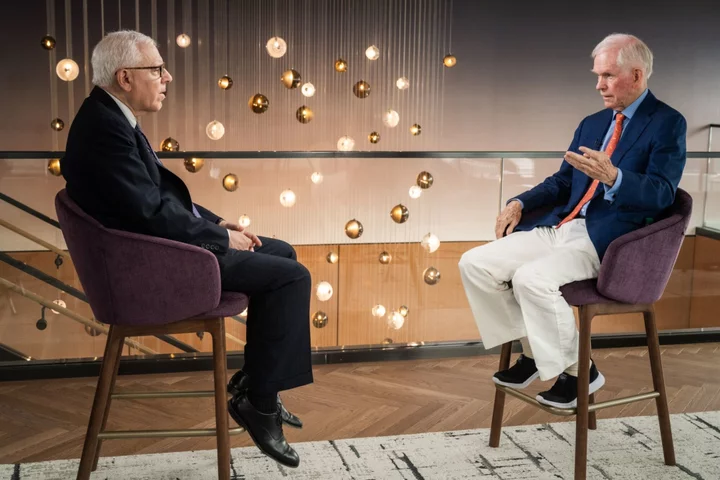The slow-moving influence of rising interest rates will end up torpedoing the economy, dashing Federal Reserve expectations that a recession can be avoided, according to renowned Wall Street curmudgeon Jeremy Grantham.
Grantham, whose own forecast for a brutal market reckoning has taken lumps in this year’s tech revival, doubled down on the gloom prophesy in an interview taped for an upcoming episode of Bloomberg Wealth with David Rubenstein.
“The Fed’s record on these things is wonderful. It’s almost guaranteed to be wrong,” said the co-founder of the Boston-based investment firm Grantham Mayo Van Otterloo, in response to a question about Chair Jerome Powell’s view that a downturn is avoidable. “They have never called a recession, and particularly not the ones following the great bubbles.”
Grantham, 84, is well known for gloomy forecasts that have occasionally presaged major market dislocations, such as in 2000 and 2008. He called the post-pandemic surge in equities “in many ways about equal to the 2000 tech bubble,” but said its deflation has been interrupted by speculation on artificial intelligence and economic stimulus that he linked to next year’s presidential election.
“Everything and its dog seems to have intruded,” he said. “It’s made life incredibly complicated. Personally I think AI is very important,” he said. “But I think it’s perhaps too little too late to save us from a recession.”
Volatility in the economy since the outbreak of Covid-19 has made miserable the lives of almost everyone trying to forecast the direction of markets. Grantham’s warnings around 2021’s unbridled bullishness — “we had some of the craziest investor behavior of all time,” he told Rubenstein — looked prescient when stocks were walloped last year. This year, with the Nasdaq 100 Index up more than 30%, they’ve occasionally seemed overblown.
Investor fervor surrounding AI — loosely defined as problem-solving using computers and big datasets — which has pushed tech stocks to lofty valuations has been something Grantham has been warning against. And while excitement around it may be propelling equities for now, he said, it won’t keep the US economy from contracting.
Recession in 2024
The deflationary impact last year’s fall in tech stocks is “too big,” he said. As higher rates continue to depress other corners of the market, particularly real estate, the US economy will see “a recession running perhaps deep into next year and an accompanying decline in stock prices.”
In January, he projected the trendline value of the S&P 500 at about 3,200 by the end of the year, more than 1,000 points below its current level.
The latest minutes from the July Federal Open Market Committee meeting revealed policymakers are still concerned about inflation, suggesting more interest-rate increases may be needed. Fed Chair Jerome Powell told reporters on July 26 that the central bank plans to keep policy restrictive until officials are confident that inflation is coming down sustainably to their 2% target.
“My base case is that we will be able to achieve inflation moving back down to our target without the kind of really significant downturn that results in high levels of job losses that we’ve seen in many past instances of tightening that looked like ours,” Powell said during press conference. The Fed’s influential staff economists — independent of policymakers — also “no longer judged that the economy would enter a mild recession toward the end of the year.”
This goal, according to Grantham, may be harder to achieve.
“I suspect inflation will never be as low as its average for the last 10 years; that we have reentered a period of moderately higher inflation and, therefore, moderately higher interest rates,” he said. “In the end, life is simple. Low rates push up asset prices. Higher rates push asset prices down. We are now in an era that will average higher rates than we had for the last 10 years.”
In January 2022, Grantham reiterated his view from the previous year that US stocks had entered a super bubble — the fourth in the last hundred years (the others were 1929, 2000 and 2006). “These super bubbles corrected all the way back to trend with much greater and longer pain than average,” he wrote.
The roughly $6 billion GMO Benchmark-Free Allocation Strategy, which allocates “dynamically across asset classes, free from the constraints of traditional benchmarks” had gained 8.52% from January through July 31, according to the fact sheet posted on its website. Meanwhile the $5 billion GMO Equity Dislocation Strategy, which is long value equities and short those the company sees as being valued at “implausible growth expectations,” had lost 3.02% from January through June 30 based on its fact sheet.
When asked if he considers himself a pessimist or a realist, Grantham said he is neither.
“I think of myself as a realist, trying to see the world as it really is and not the way I’d like it to be,” he said. “And sometimes I succeed and sometimes I fail in that.”
For the full interview with Jeremy Grantham, watch Bloomberg Wealth with David Rubenstein Tuesday September 5th on Bloomberg Television at 9:00 p.m. in New York.

